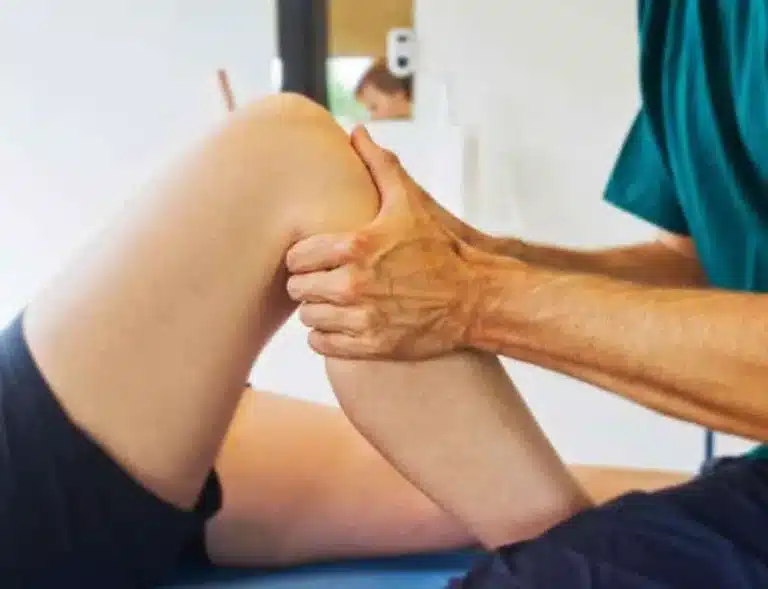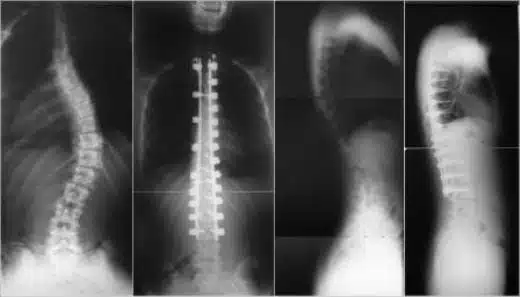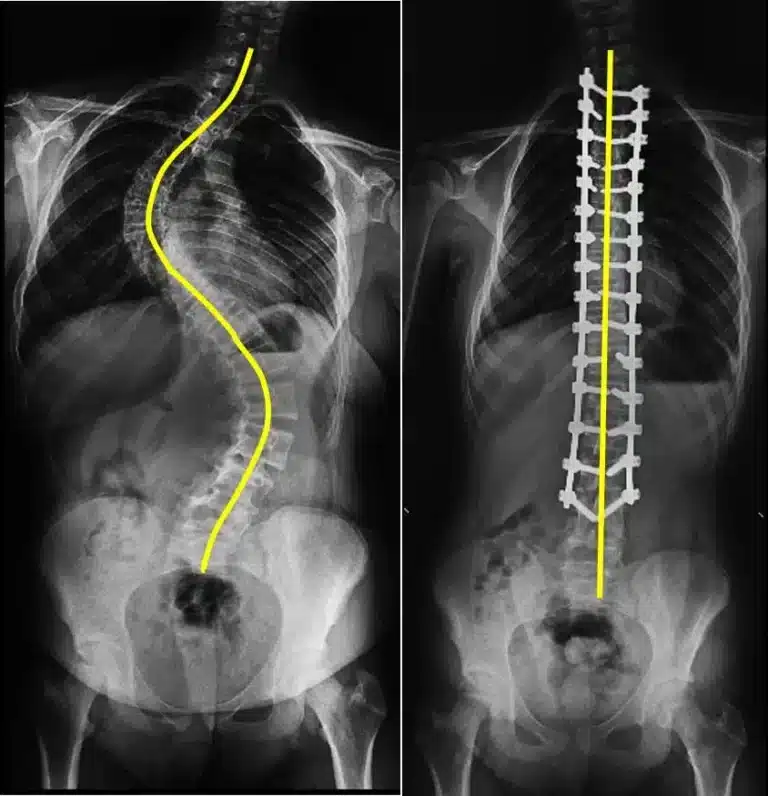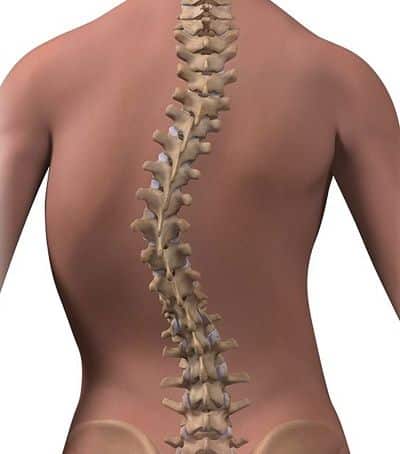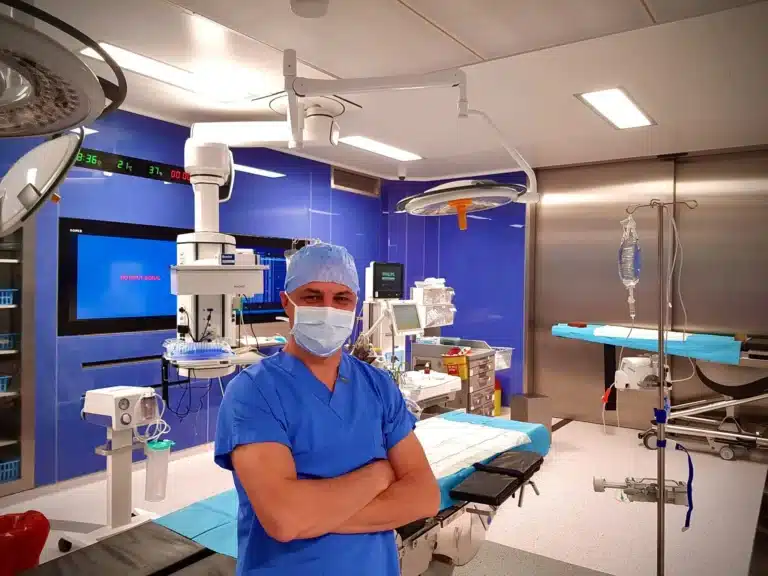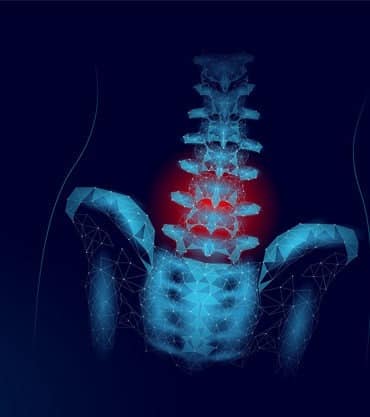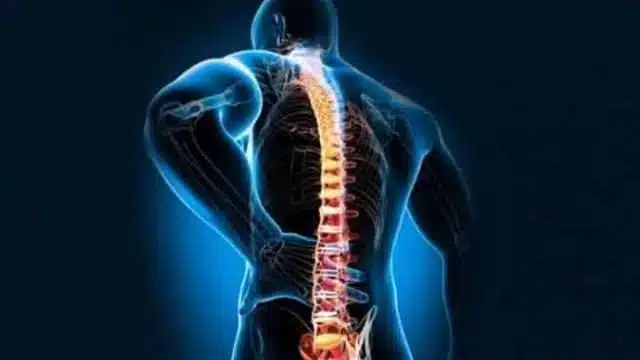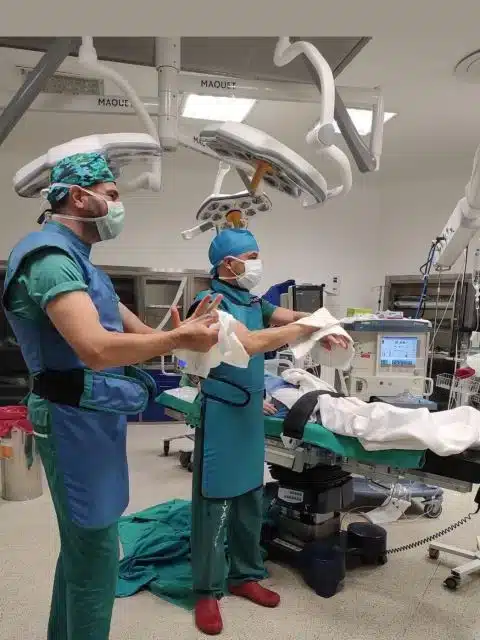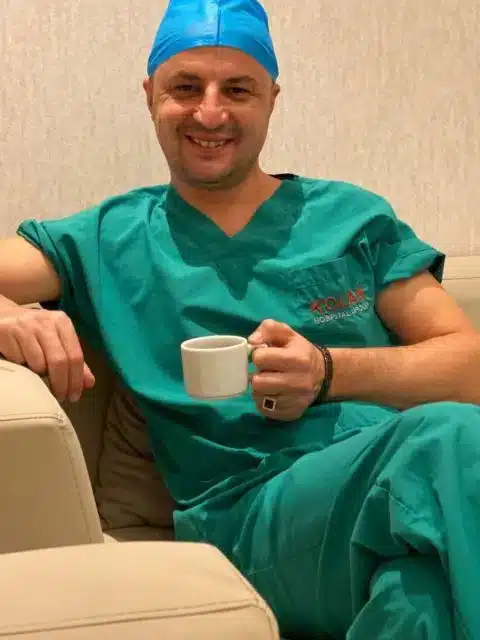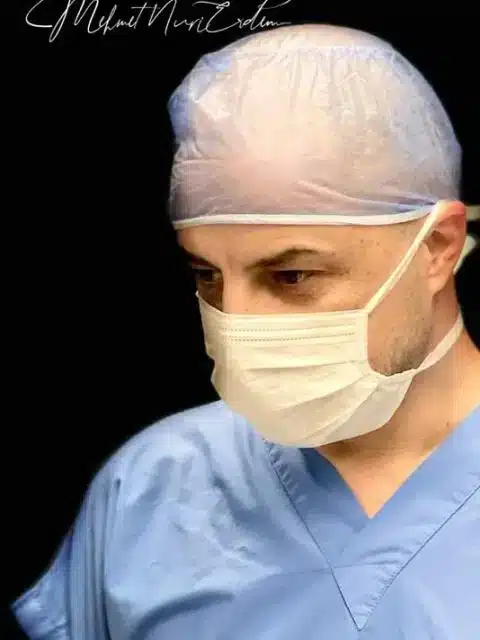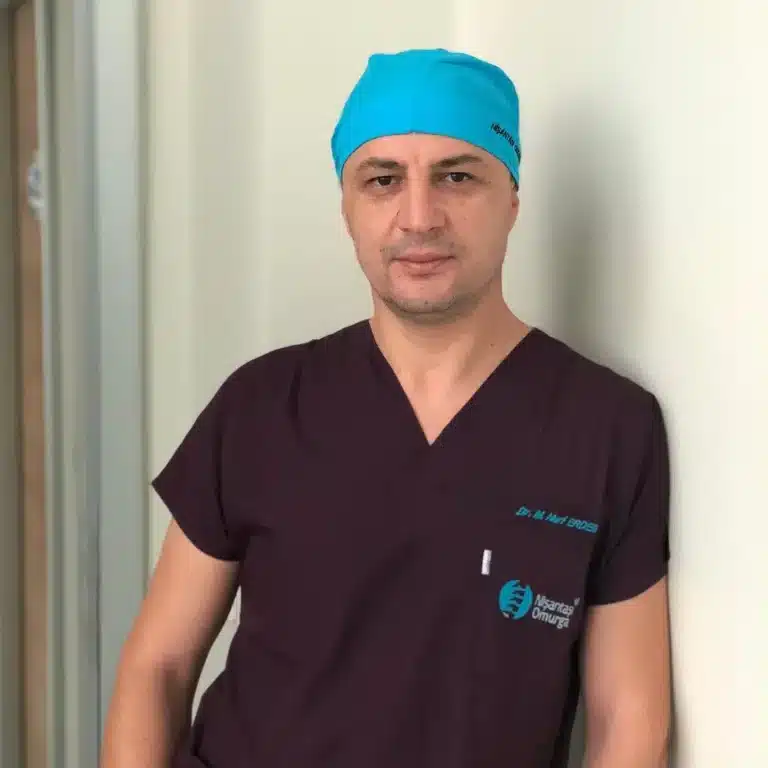This article was written by Assoc. Dr. Mehmet Nuri Erdem.
Information is provided about the surgical procedure, pre- and post-operative care, the benefits and risks of surgery, and the post-operative process.
You will find answers to many questions you may have about total knee replacement surgery.
How does the Normal Knee Joint Work?
The knee joint is the largest joint in the body, formed by the combination of the femur (thigh), tibia (shin) and patella (knee cap). The function of the knee joint is crucial in simple daily activities such as standing up and walking.
Thus, living with a damaged or injured knee joint is both painful and uncomfortable.
But you don’t have to live your life like that.
In many cases, the entire or damaged part of the knee joint can be replaced by an orthopedic surgeon.
Why do You Have Pain in Your Knees?
Pain in your knees can be due to a chronic illness, a poorly treated injury, or the corrosion and tear of continued use as you age.
The most common cause of pain and loss of function in the knee joint is arthritis, colloquially known as calcification.
Regardless of your age, if you have a problematic knee, you will be unable to perform many of the activities of daily living.
This is a progressive condition, eventually causing you to be unable to handle most of your mandatory needs alone, including your personal care.
Is Surgery a Solution?
In many cases where the knee joint loses its functions due to corrosion, replacing the joint is a remedy for knee pain.
With the surgery to be performed, an artificial joint called a prosthesis is placed instead of the damaged knee joint.
You don’t have to live your life with knee pain.
Many people regain their ability to move without pain after knee replacement surgery.
What are the Benefits of Knee Joint Replacement?
Joint pain after surgery is relieved completely or greatly reduced. Reduced pain allows you to use the knee joint more comfortably and more effective, which improves the leg muscles’ strength.

Your quality of life increases as you can do your daily work and non-challenging activities alone.
The inserted prostheses are quite long-lasting, which allows you to move freely for years.
To Whom is Total Knee Replacement Performed?
It is applied to patients whose knee articular cartilage is damaged or completely lost for any reason.
Since the cartilage tissue cannot regenerate itself, it is possible for the joint to regain its former functions only by replacing the joint with a prosthesis.
Of course, in the process leading up to the surgery ,many conservative treatment methods such as drugs, injections and physical therapy are tried.
Total knee replacement surgery is recommended for patients who do not benefit from these treatments.
How is the Decision for Surgery Made?
Do not forget; This surgery is an elective surgery with no urgency, in which your doctor believes that you should have surgery and you believe in your doctor.

Before the operation, all your health history, medications you use, previous treatments, and other diseases, if any, are examined in detail. During the examination by the orthopedist, the painful spots and swellings in your knee, the strength of the muscles around the knee, the flexibility of the tendons and the range of motion of the knee joint are evaluated.
Intraarticular narrowing and disorders in the knee joint are evaluated with X-ray, which is alone sufficient as a radiological examination in order to make a decision for surgery.
How is the Operational Plan Made?
After anamnesis, physical examination and radiological examinations, according to your age and the extent of the damage in your knee, how the joint prosthesis will be placed and the possible gains from the surgery will be shared with you.
After this stage, the possible time of surgery and the day you will apply to the hospital for anesthesia evaluation are determined.
Do’s and Dont’s Before Surgery
If you smoke, try to quit or reduce it.
Pay attention to proper diet and reduce the amount of alcohol you drink. This will help your recovery and reduce possible post-operational complications.
Tell your doctor about all the medicines you use, including over-the-counter medicines. In particular, blood thinners may need to be discontinued before the operation and, if necessary, substituted with other drugs until the operation.
Have your teeth and gum problems treated or complete your ongoing treatment, if any. Otherwise, the germs in your mouth may mix with the blood and cause an infection in the prosthesis, which may delay your recovery or cause you to have surgery again.
Do’s and Dont’s at Home Before Surgery
Simple measures can make you comfortable at home after surgery.
If your house has two floors, create a layout where you can meet all your needs on the lower floor. Remove or anchor carpets, rugs, or cables that could cause your feet to stumble. Arrange your belongings on shelves high between your waist and shoulder, trying to reduce the need to reach out or bend over to pick something.
Contact a relative or helper to accompany you during the first three weeks.
Some Important Things in Anesthesia Evaluation
Anesthesia can be planned regionally or generally. This choice depends on you and your consensus with the anesthesiologist after evaluating you.
In this evaluation, some laboratory tests and radiological examinations are requested from you, taking into account your current diseases, medications you use, surgeries you have had and your general health status.
If the anesthesiologist deems it necessary, he or she will consult you with other branch physicians such as cardiology, pulmonology etc.
If you need to receive treatment based on your existing diseases in the pre-operative period, the duration and process of this treatment are determined.
What are the Risks of Surgery?
The risks of the procedure to be performed are collected in two groups.
The first is the risks associated with anesthesia and it is mostly dependent on your existing diseases. These risks will be shared with you during the anesthesia assessment.

The main risks of total knee replacement surgery are; infection, blood clotting, corrosion and damage to the vessels or nerves in the operation area. The rate of these risks is approximately 1-1.5%. In order to avoid all these risks, all kinds of precautions will be taken by the surgical team both during and after the operation and you will be informed in detail about this issue.
What to Do on the Day of Surgery?
You must fast for at least 8 hours before the operation.
You are expected to arrive at the hospital early on the day of surgery.
You will be asked to fill out some forms.
It’s normal to be nervous and excited, but don’t worry, these surgeries usually give very positive results.
Before the operation, the doctor who will perform the operation will see you again in the hospital and inform you about the operation time.
How Long Will the Operation Take?
After admission to the operating room, anesthesia procedures, patient position, cleaning and covering take approximately one hour.
The surgery will start after this preliminary preparation.
A routine knee replacement surgery without additional procedures takes about 60-90 minutes.
Then, you will be taken from the operating room to the recovery room. Here, your general condition will be constantly monitored for about 30-60 minutes, you will be given painkillers, and then you will be taken to your room in the service.
How Will I Feel on the Day of Surgery
When you come out of the surgery, you will see that you have a urinary catheter, an intravenous line and a drain in your knee.
You will also see that special socks are worn to reduce the risks of blood clots.
You should not stand up on the day of surgery. However, it is possible to position yourself in the bed.
All your needs in this regard will be met by the allied health personnel.
All medications will be given to you intravenously.
You will be allowed to drink water and eat your first meal 4 hours after the surgery is over.
Will I Have Pain?
For the first few days, painkillers will be given intravenously. It is normal to feel some pain despite medication.
However, if the drugs do not reduce your pain, you can request additional painkillers by informing the nurses.
With the PCA (patient controlled analgesia) device, you can apply your medicine yourself for your pain without exceeding the danger limit. When you have pain, you press a button to allow a certain dose of medication to come into your body through the intravenous line.
When can I Mobilize?
On the day after the surgery (day 1), you will be asked to stand up and walk with the help of a walker in the morning.
Your doctor or physiotherapist will show you how to get out of bed, walk with a walker, sit on a sofa or chair, and go back to bed.
You will be taught whether or how much burden you can put on your new joint.
Will Physical Therapy Be Required After Surgery?
You will be shown the simple exercises you need to do from the 1st day of the surgery.
You will learn how to strengthen your leg, walk and clear your lungs. You will also be shown the exercises you will do after discharge.

In some patients, after discharge, it may be necessary to perform exercises that increase the range of motion of the knee joint and strengthen the muscles around the joint in order to get the maximum efficiency from the surgery.
In this situation; from the 2nd week after the surgery, this treatment may need to be completed at home accompanied by a physiotherapist or by applying to a physical therapy center.
Will I Have Medication and Wound Dressings After Discharge?
You will be given the medicines you need to use when you are discharged from the hospital and you will be described how to use them.
Wound dressing will be followed by a staff member who has experience in this field.
The decision to terminate the dressing and remove the stitches will be made by your doctor.
What to Do During the Recovery Period?
Whether you spend your recovery period at home or in a rehabilitation center, you must protect your new joint. You should stay away from prohibited movements, do your exercises without disruption but you should not exceed the recommended limits.

Don’t be in a hurry to return to your old activities.
You will feel some stiffness in your new joint at the beginning, remember this is natural.
When can I Resume Active Life?
Walk every day to increase your strength. Strive to do more each week.
Remember that some days you will feel better relatively.
You can return to your desk jobs 6 weeks after the surgery. But if your job requires more heavy work, it may take 3-6 months to get back.
Your recovery rate also depends on the type of surgery you had and the condition of your knee before surgery.
Total knee replacement is a major surgery and it may take several months before you feel completely well.

When are the Post-Operative Check-Ups?
After the surgery, you will be checked with x-rays in the 6th week, 3rd month and 6th month.
Afterwards, it is sufficient to have an x-ray taken every two years.
When Should I Call My Doctor?
You should contact your doctor in case of sudden increase in pain around your knee, swelling in the leg or calf, redness, heat or discharge at the surgery area, difficulty in breathing or pain in the chest and fever above 38.5 degrees.






